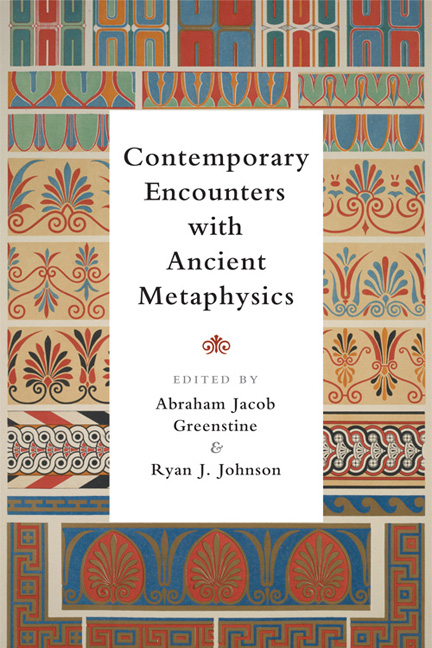Book contents
- Frontmatter
- Contents
- Acknowledgements
- Note on the Text
- Notes on Contributors
- 1 A Thousand Antiquities
- Part I Plato
- Part II Aristotle
- Part III Epicureans, Stoics, Skeptics, and Neo-Platonists
- 13 Lucretius and Naturalism [1961]
- 14 On Causality and Law in Lucretius and Contemporary Cosmology
- 15 On the Surface: The Deleuze-Stoicism Encounter
- 16 Contingency and Skepticism in Agamben's Thought
- 17 Plotinus’ “Reverse” Platonism: A Deleuzian Response to the Problem of Emanation Imagery
- Part IV Postscript
- Index
14 - On Causality and Law in Lucretius and Contemporary Cosmology
from Part III - Epicureans, Stoics, Skeptics, and Neo-Platonists
- Frontmatter
- Contents
- Acknowledgements
- Note on the Text
- Notes on Contributors
- 1 A Thousand Antiquities
- Part I Plato
- Part II Aristotle
- Part III Epicureans, Stoics, Skeptics, and Neo-Platonists
- 13 Lucretius and Naturalism [1961]
- 14 On Causality and Law in Lucretius and Contemporary Cosmology
- 15 On the Surface: The Deleuze-Stoicism Encounter
- 16 Contingency and Skepticism in Agamben's Thought
- 17 Plotinus’ “Reverse” Platonism: A Deleuzian Response to the Problem of Emanation Imagery
- Part IV Postscript
- Index
Summary
Written by Lucretius in the first century BCE, De Rerum Natura is an elaboration of Epicurean atomism that ranges over the origin of the universe, the formation of worlds, weather systems, the emergence of life and of social order, morality, and much else besides. It can be picked over for interesting anticipations of modern atomism and of evolutionary theory. Yet, as a materialist account of the emergence of order, it depends on an account of causality and law which has some surprises, and it is on these that I want to focus here. The familiar image of atoms moving and combining may lead one to expect that order in the universe depends ultimately on fixed laws governing the movement of atoms. Although there are some grounds for such a reading, they are not compelling, and Lucretius is otherwise quite clear that order consists of regularities that arise locally, varying from time to time and from place to place. That this theory of local regularities has been eclipsed by the assumption that laws are fixed says more about our own views than those of Lucretius. From the standpoint of contemporary approaches to causality, Lucretius’ account can be described as a regularity theory, where the regularities in question are a feature of the world (and not just of our perception of it). But it is distinctive in that cause and effect do not always and everywhere proceed according to the same invariable laws. Instead, causality precedes laws, which, as regularities, emerge locally and evolve along with the phenomena they determine. The causal structure of the universe is therefore real, but radically contingent. This idea sets Lucretius’ account apart from almost all existing theories of causality and law. Notable exceptions can be found in the work of Charles Sanders Peirce, to some extent in that of Émile Boutroux, and in certain quarters of contemporary cosmology. For example, Peirce writes that “there is room for serious doubt whether the fundamental laws of mechanics hold good for single atoms,” and advises that science turn its attention to “a natural history of laws of nature.” On his part, Boutroux declares that “it is chance, or destiny, or an ensemble of capricious wills, that presides in the universe.”
- Type
- Chapter
- Information
- Contemporary Encounters with Ancient Metaphysics , pp. 254 - 269Publisher: Edinburgh University PressPrint publication year: 2017

